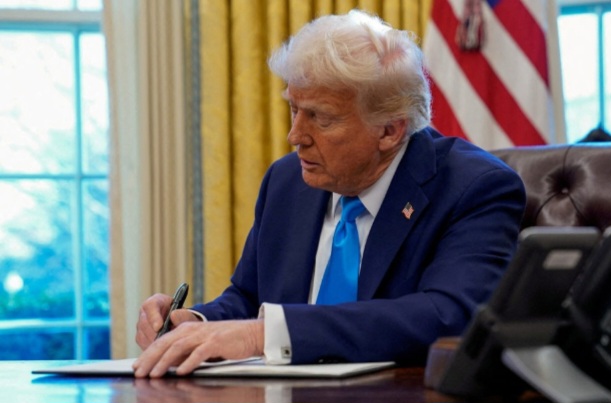President Donald Trump signed an executive order on Friday creating the White House Faith Office, a newly rebranded version of the existing Office of Faith-Based and Community Initiatives.
Now part of the Domestic Policy Council, the revamped office will work with religious leaders on matters such as religious freedom and support for adoption and foster care efforts. It will also provide guidance on federal policies and assist faith-based groups in applying for government funding.
This move follows Trump’s announcement at the National Prayer Breakfast that he is launching a task force to investigate what he called the “targeting” of Christians in America. Attorney General Pam Bondi will lead the group, which is tasked with ending religious discrimination within federal institutions like the Department of Justice, the IRS, and the FBI. Trump emphasized that the task force would also work to prosecute violence and vandalism against Christian communities and ensure full protection of religious rights nationwide.
At the Capitol event, part of a long-standing bipartisan tradition, Trump said his faith had grown stronger after surviving two failed assassination attempts in 2024. He urged Americans to “bring God back” into their lives. However, at a second prayer event later that day, Trump adopted a more partisan tone, announcing a new Commission on Religious Liberty and accusing the Biden administration of persecuting religious individuals, especially anti-abortion advocates.
Trump also celebrated his administration’s recent rollback of diversity, equity, and inclusion policies, and restrictions on transgender participation in women’s sports, stating, “Woke is gone-zo.”
Critics quickly responded. Americans United for Separation of Church and State argued the new task force could be used to justify discrimination. Rev. Paul Brandeis Raushenbush of the Interfaith Alliance accused Trump of infringing on religious freedom under the guise of defending it, citing immigration raids on churches and efforts to suppress religious diversity.
Conservative voices, however, welcomed the initiatives. Kelly Shackelford of First Liberty Institute praised Trump’s actions as vital for safeguarding faith expression in public spaces.
Trump also named Paula White-Cain, a longtime religious advisor and charismatic pastor, as the head of the new faith office. White-Cain previously led Trump’s Faith and Opportunity Initiative and is seen as one of his most trusted spiritual allies. At the prayer event, she lauded him as a powerful advocate for faith in American public life.
Religion scholars like Matthew Taylor noted that past presidents have had similar faith offices, but expressed more concern over the anti-Christian bias task force. Taylor argued that such a task force, in a majority-Christian nation, could lead to the marginalization of religious minorities.
The National Prayer Breakfast itself has undergone changes, now split into two events after lawmakers distanced themselves from the private religious group that previously organized the larger gathering. Trump attended both events, reflecting on how surviving an attempted assassination had deepened his faith. “It was God that saved me,” he said, joking that the incident luckily “didn’t affect my hair.”
As a self-described nondenominational Christian, Trump reiterated that religious liberty remains a fundamental American value and vowed to defend it completely.
Over the years, Trump’s relationship with religious leaders has been complex. He publicly criticized clergy like Rev. Mariann Budde, who had called for compassion toward the LGBTQ+ community and undocumented immigrants. Vice President JD Vance has also clashed with Catholic leaders over immigration policies. Meanwhile, many faith leaders are concerned about the removal of legal protections for churches as safe zones, fearing increased government enforcement actions at places of worship.
Since President Dwight D. Eisenhower first attended in 1953, every U.S. president has participated in the National Prayer Breakfast. This year’s honorary co-chairs were Democratic Sen. Maggie Hassan and Republican Sen. Roger Marshall.
President Joe Biden delivered remarks via livestream from the Capitol Hill event in both 2023 and 2024.














